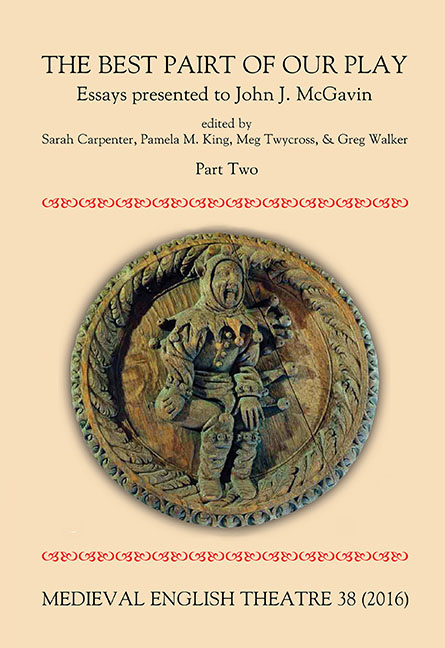 Medieval English Theatre 38
Medieval English Theatre 38 Published online by Cambridge University Press: 20 April 2017
It is easy to assume that, because both sermons and the so-called morality plays have a strong didactic aspect and are fundamentally performative genres, their relationship with their audiences must be construed along similar lines. Claims about sermon influence on the medieval English morality plays are frequently encountered in the secondary literature in connection to audience address. Edgar T. Schell and J.D. Shuchter, for instance, argue that ‘the close relationship between morality drama and sermon literature practically guarantees that it [i.e. morality drama] will be drama of direct address’. Conversely, Valentina Bernardini discusses ‘theatrical elements’ such as audience address in sermons. On the other hand, the sharp differentiation between preacher and actor, sermon and play, which is made again and again in preaching manuals indicates that for the writers of these treatises drama and preaching had their own distinct standing and function within medieval society, and that their performance ought to reflect these differences. And we shall indeed see that plays and sermons employ audience address for divergent reasons and with different effects. While these two genres are undoubtedly influenced by a common rhetorical tradition and hence display certain similarities, it is more productive to assess what their unique relationship with their audience can tell us about the role of sermons and morality plays within the complex landscape of late medieval devotion as well as about the audiences’ generic expectations and how these, in turn, shape the texts.
Unfortunately, detecting instances of audience address is not as straightforward as one would like. This is largely due to the fact that both genres have survived in written forms which are hard to relate to actual performances. It is probable that there were extra instances of direct address which are not reflected in the existing texts. For instance, the Wycliffite Dominica secunda post festum Trinitatis sermon seems to have been conceived as a bone to be fleshed out (‘Here | may men towche of al maner of sunne and specially of false | prestis’) and there may have been greater engagement with the listeners in the actual delivery than is recorded in the skeleton text. Instances of audience address are at times difficult to pin down as well.
To save this book to your Kindle, first ensure [email protected] is added to your Approved Personal Document E-mail List under your Personal Document Settings on the Manage Your Content and Devices page of your Amazon account. Then enter the ‘name’ part of your Kindle email address below. Find out more about saving to your Kindle.
Note you can select to save to either the @free.kindle.com or @kindle.com variations. ‘@free.kindle.com’ emails are free but can only be saved to your device when it is connected to wi-fi. ‘@kindle.com’ emails can be delivered even when you are not connected to wi-fi, but note that service fees apply.
Find out more about the Kindle Personal Document Service.
To save content items to your account, please confirm that you agree to abide by our usage policies. If this is the first time you use this feature, you will be asked to authorise Cambridge Core to connect with your account. Find out more about saving content to Dropbox.
To save content items to your account, please confirm that you agree to abide by our usage policies. If this is the first time you use this feature, you will be asked to authorise Cambridge Core to connect with your account. Find out more about saving content to Google Drive.